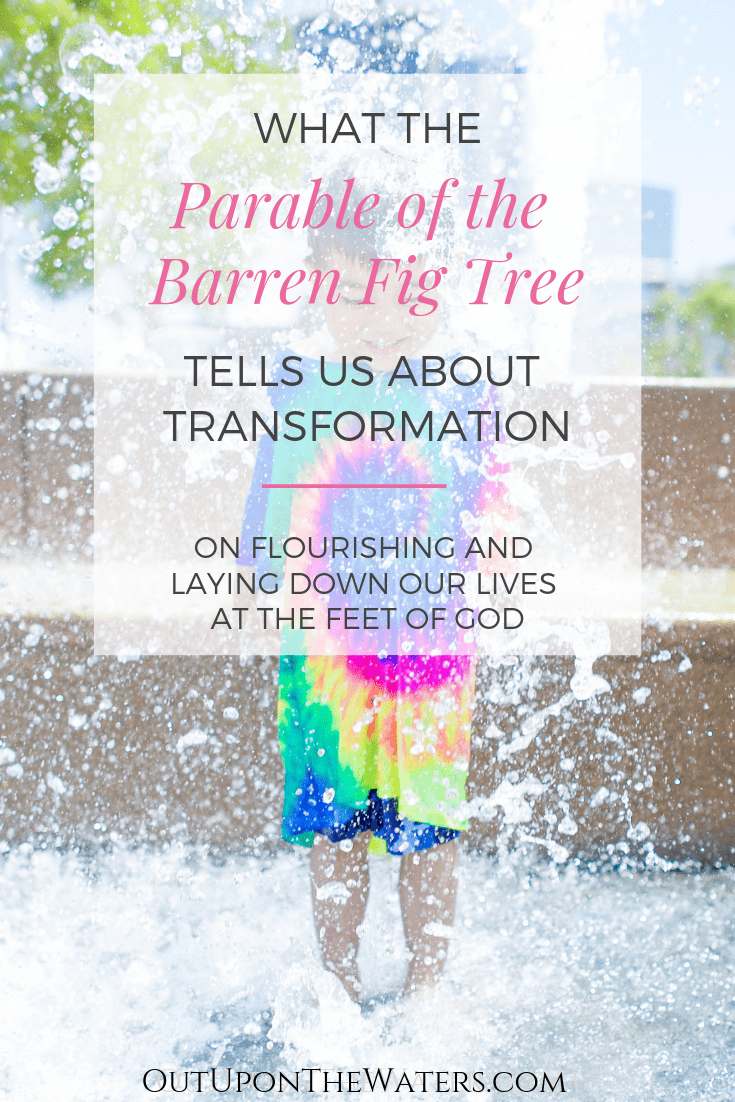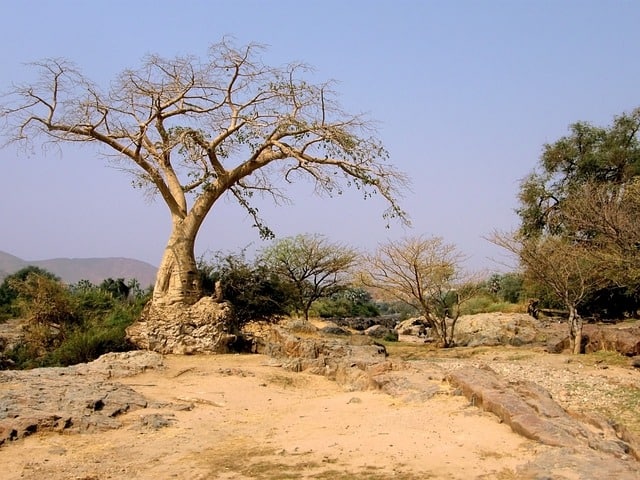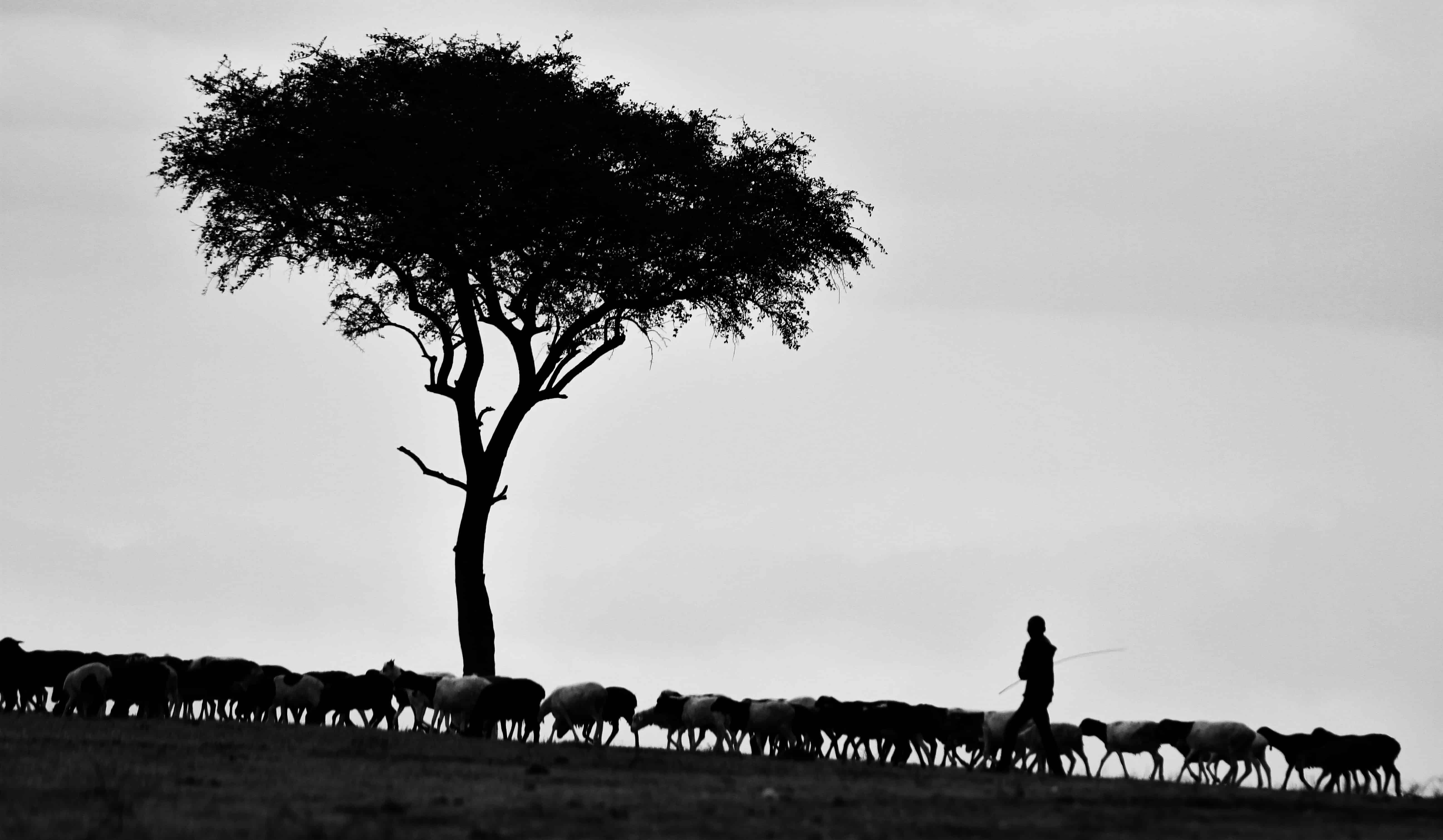In Luke 13:6-9, we hear Jesus tell a parable about a barren fig tree that should make us pause.
The story goes like this:
A man had a fig tree growing in his vineyard, and he went to look for fruit on it but did not find any. 7 So he said to the man who took care of the vineyard, ‘For three years now I’ve been coming to look for fruit on this fig tree and haven’t found any. Cut it down! Why should it use up the soil?’
8 ‘Sir,’ the man replied, ‘leave it alone for one more year, and I’ll dig around it and fertilize it. 9 If it bears fruit next year, fine! If not, then cut it down.’
--
Repent or perish. That’s quite the choice, isn’t it? Repent or perish. I don’t know about you, but these words remind me of those people you see sometimes standing on street corners with sandwich boards, proclaiming that the end is near. Repent or perish.
But what does Jesus mean by this? He uses the same phrase twice in this short passage: “unless you repent, you too will perish”.
Does this mean that we need to sit before God each week, listing our sins, expressing our sorrow and regret that we messed things up, that we acted as we shouldn’t have, and promise to do better next time? Does this mean that we have to say “sorry” or we’re going to be cast into the fires of hell?


Repentance is First and Foremost about Redirection and Transformation
We might tend to think of repentance as a divinely-sanctioned version of apology, as a listing of our sins and expressing regret that we messed things up.
Repentance, we are typically told, is some form of "I'm sorry I stole (or lied, or cheated...). I feel really bad about it. I promise to do better next time."
But I don't think that this sort of repentance is what Jesus has in mind when he says, "unless you repent, you too will perish."
Unless we list our transgressions before God and feel really bad about what we've done, we'll be cast into hell?
Couldn't repentance be bigger than this? Mightn't it be something that involves a divine re-ordering of the things that went wrong in the world?
What if repentance were not about listing the bad things that we've done and acknowledging that we deserve punishment, but rather about setting all things right by taking up our proper place in the universe?
What if it were about redirecting our whole lives and being connected to God, to the source of life itself, and in this redirection and this connection, in being radically transformed into heavenly creatures? Into fruit-bearing trees?
--
“For three years now I’ve been coming to look for fruit on this fig tree,” says the man in the parable, the man who owns the vineyard, “and I haven’t found any. Cut it down! Why should it use up the soil?” Harsh words, if we’re thinking about ourselves as this fig tree: cut it down!
But the caretaker of the vineyard manages to talk the owner down. “’Sir,’ the man replied, ‘leave it alone for one more year, and I’ll dig around it and fertilize it. If it bears fruit next year, fine! If not, then cut it down.”
This is significant, I think, in talking about repentance, about what repentance looks like and why the alternative is to perish.
The caretaker of the vineyard wants to dig around the fig trees’ roots and fertilize it.
The NLT translation says “I’ll give it special attention and plenty of fertilizer.”
Before we talk more about digging around the roots, however, I want to tell another story: this one about Dwarfs at the very end of the universe.


A Story of Dwarfs During the End Times
In the 7th book of the Narnia series, C.S. Lewis paints a picture of the end times. The anti-Christ has come and has incited war in Narnia. At the end of the battle, all the creatures are made to walk through a stable door.
Now this isn’t just any stable door. It’s a door that leads to Aslan’s country, to heaven (or to hell). What we find on the other side of the stable door is, I think, very instructive for thinking about the fig tree passage that we find in Luke.
When Lucy, Jill, Eustace, and Tirian, the four protagonists of this particular story, go through the stable door, they find themselves in what Lewis calls Aslan’s country - that is, in heaven. Now heaven here is described as a bright countryside with sunshine, rolling hills, fields of grass and wildflowers….
But when the children find the Dwarfs, who are also, importantly, in Aslan’s country, they find them sitting very close together in a circle, facing one another. When the children get too close for the Dwarfs comfort, they (the Dwarfs, that is) snap at them, saying “Mind where you’re going!” and “Don’t walk into our faces!”
This prompts a brief exchange during which the children learn that the Dwarfs don’t in fact see sunlit fields of wildflowers, rolling hills, and flowing rivers. They see only the inside of a dark, dirty stable.
Lucy tries to help the Dwarfs by handing them some wild violets. “Can you smell that?” she asks. Again, the Dwarfs snap at her, shouting that she is shoving dirty stable litter into their faces.
Despite all the children’s attempts to help the Dwarfs to see the beauty of where they really are, the Dwarfs only smell dirty stable litter, and they see only darkness.
Aslan himself (the Jesus figure of this story) approaches the Dwarfs and creates before them a glorious feast of decadent treats. The Dwarfs begin eating and drinking greedily, but, as the narrator notes, “they couldn’t taste it properly. They thought they were eating and drinking only the sort of things you might find in a Stable” (748).
What has happened in this story is that the Dwarfs have lived lives that were so consistently and thoroughly self-interested and greedy, that they turned themselves into the sorts of creatures who could not even see heaven when it was right in front of them. They became quite literally blind to God and all his goodness.

Every Action Turns Us Either Towards God or Away From Him
Elsewhere, in Mere Christianity, Lewis describes this principle of sanctification (of our becoming heavenly or hellish creatures) this way: Each choice that we make in our lives turns us either towards God or away from God; every thought, word, and deed turns that core, central part of us into either a heavenly creature or a hellish one.
Which basically means that we are constantly undergoing a transformation.
We are shaping ourselves into creatures who would be at home in heaven, or those who would see only stable litter.
The Dwarfs’ consistent suspicion and greed made them so suspicious of an offer of anything good that they literally could not see the good things right in front of them. They had so consistently and thoroughly turned away from God that they could no longer even see Him.

The Barren Fig Tree: Repentance, Redirection, and Transformation
And what does this have to do with a fig tree bearing fruit?
When Jesus says “unless you repent, you too will perish”, I think that he is hinting at this process of transformation, of sanctification.
Repentance is not just a listing of our sins, but rather a matter of redirection, of putting God first and everything else second - it is this redirection of our desires, our hopes, our dreams, and our entire lives that results in flourishing and transformation.
If we refuse God’s grace, if we rely on ourselves instead of on Him, if we put our own self-interest and our own comfort over and above obeying the will of God and following Jesus where he leads, then what could we do but perish?
If we refuse to repent - and by repent here, I mean submit our entire wills to that of God, and turn our entire lives towards him - then what could we do but wither and die?
The alternative to this redirection of our whole selves is to perish.
Numerous theologians throughout history have described death - our perishing - as a punishment. Augustine says that it’s a fitting punishment. It is fitting because in our rebellion against God, in our setting our own wills above the will of the Creator, we are turning from the very source of life itself. We are cutting ourselves off from the vine (so says Jesus in John 15).
What else could we do, if we turn away from the very source of life, but perish?
But, the caretaker of the vineyard insists, let me dig around the roots and fertilize the tree before you cut it down. Let us see if it will then bear any fruit.


Transformation Comes When We Get Close to God
And so, what does digging around the roots look like for us?
Well, if John 15 is any guide, then we must spend time in the presence of God. We must be connected to the vine, to Christ, to the source of all life. When we firmly root our lives in Christ, then we can expect to bear fruit. But if our roots go unfertilized - if we are cut off from the source of all life - then we may be fruitless and barren.
Rowan Williams has some insightful things to say about spending time in the presence of God. I had the pleasure of hearing him speak just last weekend in London, Ontario. During this talk, he described a church as “a group of people hanging around in the company of Jesus, hoping they pick something up.”
There’s something to this, isn’t there? As Christians, what we hope to do is to get close to God, and in getting close to him, to somehow be transformed more into the likeness of Christ. We hope to become bright, shiny, heavenly creatures full of light and joy. And we do this by getting close to God.
Lewis describes this process as like getting close to a fountain: If you get close enough, the spray will wet you. If we get close enough to Jesus, we will be transformed more into heavenly creatures and less into earthly ones.
Of course, this doesn’t mean neglecting the body, the earth, the world in which we find ourselves. It means taking up the whole world in transformation with us.
We are to be carriers of this transformation into the world. We are to bask in the rays of light that come from God, and then we are tasked with bringing that light into the world, with banishing the darkness by being bright, shiny lights of love and of truth.
How do we do this? The Biblical model is prayer, study, obedience, and shall we say helpfulness, or compassion, or love.
Jesus shows us how to spend time with God by himself spending time with his Father:
- through prayer (in the garden of Gesthemane, before his crucifixion; and in teaching us the Lord’s prayer - which, crucially, reminds us to take things day by day, and to trust in God, not in the world or in ourselves),
- in study (Jesus was able to rebuke the devil during his temptation in the desert because he knew the Scriptures and he knew the promises and the demands of God),
- in obedience (again in Gesthemane, most poignantly, when Jesus says “not my will, but yours be done”),
- and in helping others and - I like this one - eating with others.

Transformation Does Not Happen in Isolation
Transformation, we can note, doesn’t come in isolation. Jesus doesn’t do his ministry in isolation.
He withdraws, certainly, especially to pray.
But he also spends time at a wedding feast, at what was perhaps the world’s largest picnic (when he fed the 5,000), and breaking bread not only with his disciples, with his inner circle, but also with sinners and with tax collectors, with the lowest of society, with those who were most definitely outside of the ‘religious elite’.
And so, I think, digging around the roots looks, for us, like prayer, like study, like intentionally following where we see God leading us, but also like carrying the light that shines in us out into the world, into our own backyards, and getting close enough to others that they might catch what we have as well, that they too might be transformed.
Indeed, we are called to invite others to hang around with us in the company of Jesus and hope that we all pick something up.
I’d like to end these few thoughts on the parable of the fig tree with another point made by Rowan Williams on transformation and discipleship: If anyone is in Christ, Paul tells us in 2 Corinthians, there is a new creation. There is transformation.
And the difference that this transformation makes to our action is that our actions are no longer dictated by self-preservation, self-interest, and the desire to remain within our comfort zones.
This is repentance: it is a redirection, a redirection of our entire lives, of all our desires, our hopes and our dreams, and in this redirection we find fruitfulness, transformation, and flourishing.
In this laying down of our entire lives at the feet of Jesus (and maybe sitting there ourselves a while), we become more deeply-rooted in the life of God, in the source of all life, and it is then that we experience a life-giving transformation that shapes us into heavenly creatures, and into children of God who can go out and bear fruit.
And so,it is worth pausing to reflect on what parts of our own lives need transformation. What parts are stagnant and barren? Where in your life do you need to dig around the roots and to fertilize?
God promises us flourishing, fruitfulness, and transformation if we remain rooted in Christ. But, of course, we cannot neglect the digging.

Very well written and easy to understand.
Thanks, mom. 😉
Comments are closed.